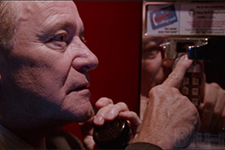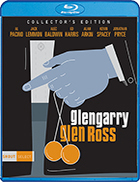Glengarry Glen Ross
|  James Foley’s caustic, driving cinematic version of David Mamet’s Pulitzer Prize-winning 1983 play Glengarry Glen Ross is a hard, cynical tale of real estate agents fallen on hard times. It presents its characters as both victims and victimizers, deceivers and deceived, callous and sad. Even as they lie, con, cheat, and connive people, these salesmen are themselves being targeted by Mitch & Murray, the corporation for which they work, which has decided that only the top two salesmen in the office will have jobs at the end of the month. This is made all the harder because the salesmen have to keep pursuing the same old, tired leads—people who have expressed interest somewhere at some time in buying real estate and have already been pitched multiple times—and can’t get their hands on the new, coveted Glengarry leads until they have closed a deal. But, as they keep pointing out, they can’t close a deal without decent leads. It’s a no-win situation, a catch-22. The film is divided into two acts. The first act deals with the salesmen learning of their impending fate and doing everything in their power to sell to the deadbeat leads they have been given. The second act follows what happens the next morning after someone has broken into the office and stolen the contracts, the phones, and, most importantly, the Glengarry leads. Everyone is a suspect immediately, and the man who seems to bear the most suspicion has an alibi. In an unforgettable scene early in the film, a corporate man named Blake (played with pompous intensity by an unusually effective Alec Baldwin) comes down to the small, crowded sales office for a little “pep talk” with the salesmen. In truth, it is more like hazing. According to Blake, the top salesman wins a Cadillac, runner-up wins a set of steak knives, and everyone else is fired. Baldwin delivers Mamet’s expletive-laden prose with brute severity. Unlike the struggling salesmen around him, he doesn’t have to sweet talk and put up a front—he lets his vicious intentions be known right off the bat. “You can’t sell shit, you are shit, hit the bricks pal, ’cause you are going out!” he barks. This turns out to be especially tough news for Shelley “The Machine” Levene (Jack Lemmon), who was once top of the heap, but hasn’t closed a deal in months and is saddled with a daughter in the hospital and a dim future. He is so desperate that he is willing bribe the uptight office manager (Kevin Spacey) for some of the good leads, but it is all to no avail. Like that other great fictional salesman, Arthur Miller’s Willie Loman, Shelley is doomed. Another salesman, Dave Moss (Ed Harris), is thoroughly insulted by the whole idea, and he lets an impressionable fellow salesman (Alan Arkin) know that he plans to steal the coveted Glengarry leads and sell them to the competition. The conversation between these two men, where ideas are shared but never really put out in the open, is a concentrated work of verbal genius (“We're just talking about this, right? We're not really talking about it.”) The only salesman who doesn’t seem worried is Ricky Roma (Al Pacino). Roma doesn’t even make the meeting with Blake because he is currently at the top of the sales board and he is too busy sweet-talking a naïve prospective buyer (Jonathan Pryce) in a bar. Roma represents everything that is good and bad about salesman: He is easy-going, receptive, and social, but all that is just a façade to get in close so he can make a deal. In one masterfully written scene, Pryce comes back the next morning and tries to undo the deal, and Pacino continually spins the conversation, going off on tangents, telling lies, confusing the facts—basically anything to keep the deal from going bad. Director James Foley (At Close Range, The Chamber) stays back for the most part and lets his talented ensemble case do their thing. Pacino was nominated for both a Golden Globe and an Academy Award for his role, but the real stand-out is Lemmon. He makes the aging Shelley Levene into a character who is both despicable and terribly endearing at the same time. In some scenes, you can’t believe his loud-mouthed arrogance, and, in other scenes, his defeat is so palpable that it hurts to look at him. Lemmon’s best scene occurs in the house of a prospective buyer who is obviously uninterested, but Lemmon continues pushing in every way possible. He knows that he cannot make the sale, but he continues trying because he has no choice. It is a pathetic, heartbreaking moment. Mamet is known for his commanding use of prose, and it has never been so evident as it is here. His harsh., profanity-laced dialogue reverberates and intensifies in the film’s claustrophobic atmosphere. Everything feels cramped despite the use of the ’Scope aspect ratio, whether that be in the paper-strewn office or in the pouring rain outside beneath the railroad tracks (the play was explicitly set, like many of Mamet’s works, in Chicago, but the film version keeps the urban location vague, which gives it a more universal sensibility). There is, literally and figuratively, no escape for these characters. And that is where the film gets its power: Glengarry Glen Ross moves us because there is always the sense of impending doom. These broken men are fighting against an impenetrable wall, which causes their frustrations to come out in the worst ways; it a particularly brutal depiction of toxic masculinity before that was a term. Mamet knows these men would take advantage of anyone they could, but he also understands that they are just trying to survive in a hard world. Maybe some other time or in some other place, they could have been better men, and that is their tragedy.
Copyright © 2021 James Kendrick Thoughts? E-mail James Kendrick All images copyright © Shout! Factory | |||||||||||||||||||||||||||||
Overall Rating: 


 (3.5)
(3.5)


